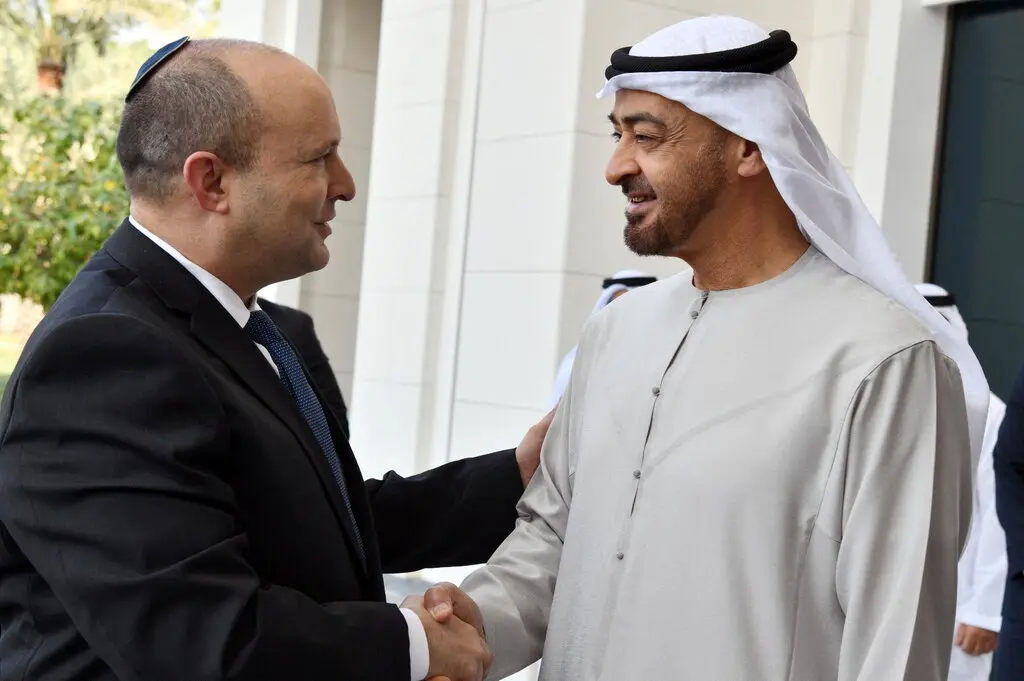It was a milestone in the annals of Israel’s bilateral relations with the Arab world.
On December 13, Naftali Bennett became the first Israeli prime minister to visit the United Arab Emirates. It is one of four Arab countries that agreed to normalize relations with Israel under the diplomatic umbrella of the 2020 Abraham accords, which was brokered by the former U.S. president, Donald Trump.
Bennett arrived in the UAE six months after Israeli Foreign Minister Yair Lapid opened Israel’s embassy in Abu Dhabi. Following Lapid’s visit, several Israeli ministers visited the Persian Gulf kingdom as well.
Bennett’s predecessor, Benjamin Netanyahu, was supposed to have paid a visit to the UAE, but due to a variety of reasons, he was compelled to cancel his trip no less than three times.
No such bad luck bedevilled Bennett. Six months into his premiership, he has cemented Israel’s burgeoning relationship with the UAE, a monarchy that wants to do business with Israel and shares its fear of a nuclear-armed Iran.
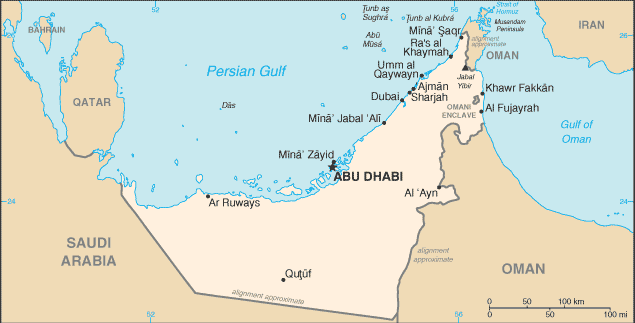
The speed and vigor with which the two countries have consolidated relations is astounding. No such thing happened after Israel signed peace treaties with Egypt and Jordan in 1979 and 1994 respectively.
When Bennett arrived in Abu Dhabi, the UAE’s youth national soccer squad was in Israel playing Israel’s team. It was the first such visit by an Arab national sports club in Israel’s history.
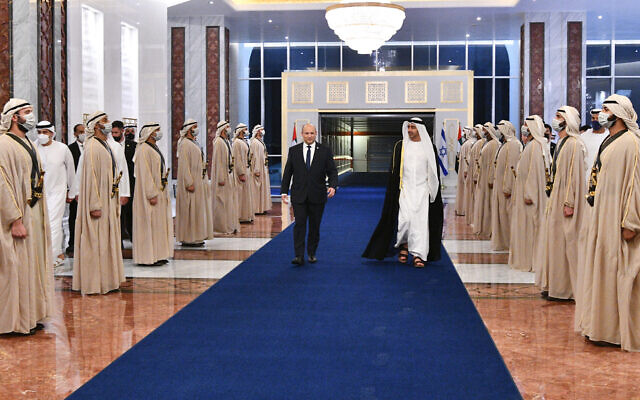
Bennett was greeted at the airport by Foreign Minister Sheikh Abdullah bin Zayed bin Sultan al-Nahyan, a member of the royal family. Bennett told him he wished to strengthen Israel’s growing ties with the UAE, a major regional force in recent years.
Bennett spent four hours, two hours longer than scheduled, with the Emirati leader, Crown Prince Mohammed bin Zayed. Before conferring with him, he met the minister of industry and advanced technology, Sultan Ahmed al-Jaber, and the minister of culture, Noura bint Mohammed al-Kaabi.
Prior to arriving in the UAE, Bennett described Israel-UAE relations as “a precious treasure.”
As he put it, “The relations between the two countries have strengthened in all fields and I am very satisfied with that, as many cooperation agreements were concluded in the fields of trade, research and development, cyber security, health, education, aviation and more, and I look forward to continued development and consolidation of relations. Our cooperation provides unprecedented economic opportunities not only for us, but for more countries, which is another element for enhancing stability and prosperity in this region.”
Bennett added, “The message I wish to deliver to the United Arab Emirates’ leaders and Emirati citizens is that mutual partnership and friendship are natural. We are neighbors and cousins. We are the grandchildren of Prophet Abraham. The period since the signing of the Abraham peace accords is the best evidence.”
The crown prince sounded an upbeat note, too. On the eve of his meeting with Bennett, he said he hoped to “advance the relationship of cooperation toward more positive steps in the interests of the people of the two nations and the region.”
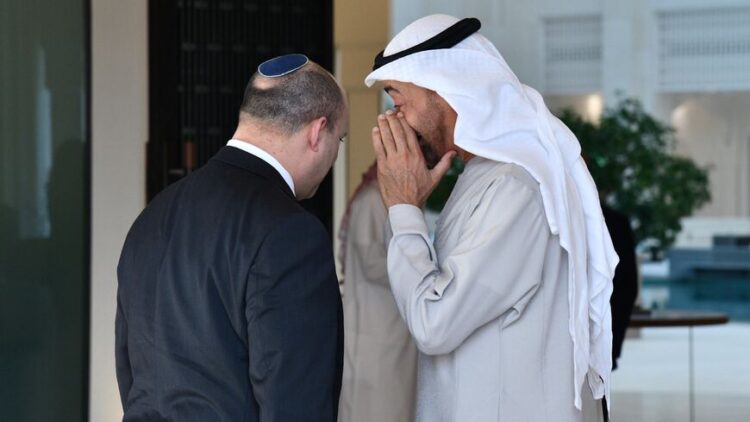
At the conclusion of their talks, Bennett said, “I’m flying back to Israel very optimistic that this relationship can set an example of how we can make peace here in the Middle East.”
In a joint statement, Bennett and the crown prince hailed their meeting as “another milestone in the development of warm relations and a tremendous partnership forged between the two countries.” In a sign of the UAE’s evolving relations with Israel, he announced he had accepted an invitation to visit Israel, though an exact date has yet to be set.
Economic issues dominated their agenda. The leaders discussed trade, which has grown by leaps and bounds in the last year and is expected to reach the $10 billion mark in the next few years. They also raised the issue of a free trade agreement in the near future.
It is unclear whether they discussed Iran, whose nuclear program is opposed by both Israel and the UAE. Israel rejected the 2015 Iran nuclear agreement, whose fate has been hanging in the balance since the United States’ withdrawal from it in 2018 during Trump’s presidency.
Israel has threatened to attack Iran’s nuclear facilities, but the UAE has adopted a more cautious approach. Last week, the UAE’s national security advisor, Sheikh Tahnoun bin Zayed al-Nahyan, flew to Teheran to hold discussions with Iran’s new, hardline president, Ebrahim Raisi.
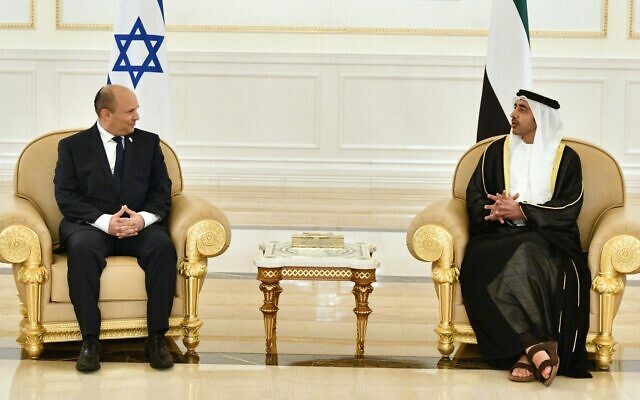
According to reports, the Palestinian question, the beating heart of the Arab-Israeli conflict, did not come up for discussion during Bennett’s meeting with the crown prince. The UAE, unlike the current Israeli government, supports a two-state solution. But for now, the UAE is not prepared to sacrifice its links to Israel to further the Palestinian cause.
Its neighbor, Saudi Arabia, hews to a far different policy, with Saudi officials having said that a normalization process with Israel will not be on the table until the Palestinians achieve statehood. This scenario is unlikely to materialize as long as Bennett is prime minister. Like Netanyahu, he strongly opposes the formation of a Palestinian state in the West Bank.
